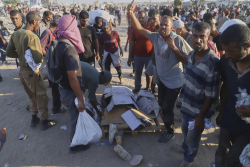Caught between allies and neighbors, Azerbaijan is walking a diplomatic tightrope amid Israeli strikes on Iran, balancing security partnerships, ethnic ties, and regional interests to avoid conflict spillover and backlash.
The Israeli strikes on Iran during the 12-day war, including targets near Tabriz, the center of the Iranian Azerbaijan, a city I walked through just two weeks prior, followed by US attacks on Iran’s nuclear sites, have placed the Republic of Azerbaijan in an unenviable strategic vice.
Baku is forced to perform a delicate balancing act between its Israeli ally, Turkish patron, American superpower, and Iranian neighbor as the region teeters toward wider conflict.
Azerbaijan Is a Neutral Country in the Israel-Iran War
Azerbaijan officially advocated for de-escalation throughout the conflict, which reflects both diplomatic pragmatism and deeper geopolitical calculations. Baku has little to gain from open conflict with Iran, given shared borders, economic ties, and the risk of spillover into its territory, with potential migration flows in the case of a prolonged conflict.
Azerbaijan and Iran are engaged in gas swap deals: Iran facilitates Turkmen gas exports to Azerbaijan and onward to Europe. Azerbaijan is a key hub in the International North-South Transport Corridor, a multimodal trade route connecting Russia and Europe to India and Iran via the Caucasus and the Caspian Sea. The war and destabilization of Iran would seriously imperil that route and undermine Azerbaijan’s transit potential.
There is also a heightened risk of terrorist activity against Israeli and American interests on the Azerbaijani territory. In the past, both Baku and Jerusalem accused Tehran of orchestrating plots against Israeli and Jewish targets in Baku. None of these allegations was convincingly substantiated. However, in the case of a prolonged conflict, a surge in asymmetrical warfare, including terrorism, cannot be excluded.
The public opinion in Azerbaijan can also not be dismissed easily. While elites in Baku are sympathetic to Israel and distrustful of Iran, people in Shiite strongholds, such as villages around the capital (like Nardaran) or southern towns like Lankaran and Massally, may lean more towards their co-religionists in Iran.
Numerous historical, cultural, religious, and familial ties unite the people of Azerbaijan, particularly in the south, with those in Iran. If the ceasefire midwifed by US President Donald Trump does not hold and the war resumes, the more anti-Israel sentiment could solidify and pose a headache to officials in Baku down the road, especially if civilian targets in Iran are again going to be hit.
These concerns should be set against Baku’s close alliance with Jerusalem. This strategic partnership is focused on arms sales (e.g., Israeli drones used in Baku’s Karabakh wars against Armenia in 2020-2023), oil trade (up to some 40 percent of Israel’s needs are covered by Azerbaijani supplies), and intelligence sharing to counter Iran.
Turkey’s Role in Azerbaijan’s Foreign Policy
The third element of the puzzle is Turkey’s role. Ankara is a close ally of Baku, but it condemns Israel rhetorically for its actions in Gaza, Syria, and now Iran. Still, Ankara maintains trade ties with Israel, notably through oil transit from Azerbaijan. Turkey sees Iran as a competitor in the Middle East and South Caucasus, and won’t be allergic to seeing it weakened, though a complete collapse would be profoundly destabilizing.
Squaring these competing considerations, Baku won’t be eager to see a regime collapse in Iran, but it might have a tacit interest in weakening Tehran’s grip over the country.
Public neutrality avoids provoking Iran while keeping Israel, the US, and Turkey reassured. Behind closed doors, however, Baku views Iran’s vulnerability as an opportunity to advance its interests.
What Are Azerbaijan’s National Interests?
One of them is a further isolation of Armenia, its regional foe. Baku may calculate that a war with Israel and the US will distract Tehran and undermine its ability to oppose the so-called Zangezour corridor, i.e., an extraterritorial land route that Baku seeks through Armenia to connect the Azerbaijani mainland with its exclave in Nakhchivan and Turkey. Tehran staunchly opposed the idea of such a corridor as it feared it would cut it off from its border with Armenia.
A weakened and fragmented Iran could also serve Baku’s interests in expanding its influence over Azeri-populated regions in Iran’s north. While the promotion of separatism isn’t an explicit policy, Baku regularly hosts and offers platforms to anti-regime Azerbaijani exiles from Iran.
Degraded Tehran aligns with the interests of Israel and Turkey. Indeed, a recent editorial in the Jerusalem Post openly called for a strategy of balkanization of Iran, i.e., dismemberment along ethnic-regional lines. Baku’s also reportedly asked Israel not to bomb the Azerbaijani-populated regions in Iran, in what could be seen as an attempt to capitalize on the war to expand its soft power there.
There are, however, limits to such a strategy. Ethnic ties do not automatically translate into political leverage. While Azerbaijanis account for, according to different estimates, up to 25 percent of the Iranian population, most overwhelmingly identify with the Iranian state. Despite linguistic affinity with Azerbaijan, economic grievances seemed to outweigh ethnic tensions in local discourse far.
Subsequent Israeli strikes on Iranian soil, including on Tabriz, appear to have strengthened nationalist cohesion rather than fueled ethnic unrest. In that context, Baku’s close ties with Israel come under an increasingly critical scrutiny in Iran. Mehdi Sobhani, Iran’s ambassador to Armenia, recently said that Iran has called on Azerbaijan to conduct a thorough investigation of the allegations that the Israeli drones entered Iranian airspace from Azerbaijan.
The unifying effects of Iranian nationalism make any notion, popular in neoconservative circles in the US, that Baku could exploit ethnic ties to destabilize Iran a highly doubtful prospect.
Additionally, Turkey, even if interested in weakening Iran, will not seek its disintegration as it would likely inflame the Kurdish separatism to a much greater extent than the Azeri one.
Indeed, the Iranian offshoot of the terrorist PKK (Kurdish Workers’ Party), PJAK (Free Life of Kurdistan), called on taking advantage of Israel’s strikes to reignite protests against Tehran. As Turkey engaged in its delicate peace process with its Kurds, the last thing it needs is a repeat of the Iraqi and Syrian experiences, where the collapse of the central authority empowered radical Kurdish nationalist movements.
The resumption of hostilities, if the fragile ceasefire unravels, would exacerbate the dilemmas facing Baku. It will try to preserve its Israeli security partnership while quietly sharing intelligence with the US, even at the cost of an erosion of its relations with Iran. At the same time, Baku will try to avoid direct Iranian retaliation and control potential spillover from the war in Azerbaijan.
The longer the conflict lasts and the more widely it expands, involving not only Israel and Iran but also the US and regional actors, the more precarious this balancing act is likely to prove for Baku.
About the Author: Eldar Mamedov
Eldar Mamedov is a Brussels-based foreign policy expert. He has degrees from the University of Latvia and the Diplomatic School in Madrid, Spain. He has worked in the Ministry of Foreign Affairs of Latvia and as a diplomat in Latvian embassies in Washington and Madrid. Since 2009, Mamedov has served as a political advisor to the Social Democrats in the Foreign Affairs Committee of the European Parliament (EP) and is responsible for the EP delegations for inter-parliamentary relations with Iran, Iraq, and the Arabian Peninsula. Find him on X: @EldarMamedov4.
Image Credit: Shutterstock/paparazzza.


















